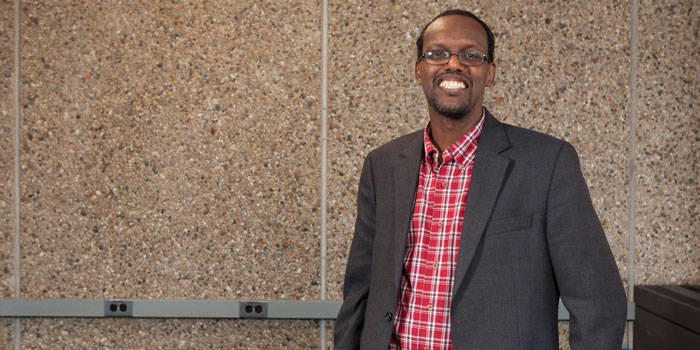Teaching biochemistry sparked a fascination with how students can best learn scientific concepts

When he was growing up, Abdi Warfa was sure he’d become a medical doctor (when he wasn’t dreaming about becoming a professional soccer player). When he was an undergraduate, he started working with a protein folding project in the research lab of his biochemistry instructor, and he began to pursue a research career. Then he started teaching, and a new life path appeared. He became fascinated by the science behind learning itself.
“I saw little connection between how science is generally being taught and how people actually learn, and I wanted to change that,” he says. His interest in the field led him to complete a Ph.D. from the university (Science Education, ’13) and to become one of the newest Assistant Professors in the Department of Biology Teaching and Learning (BTL).
In his new role, he’ll be examining current instructional strategies, determining which ones are most effective in helping students understand biological concepts. “In addition to examining the nature of student-teacher interactions in engaged classrooms, I’m also interested in understanding how modeling and model-based practices facilitate or impede student learning of biological concepts,” he says.
Second chances
In Abdi’s Medium.com essay From Refugee to Ph.D., he describes his early years living in Mogadishu, Somalia. His mother was illiterate and his father had an eighth-grade education, but they were insistent that Warfa would receive the best possible education. “My mother’s illiteracy did not stop her from going all ‘tiger mom’ on me,” he says. Following the outbreak of the Somali Civil War in 1991, his family lived in a camp in Kenya, arriving in the United States as refugees in 1994.
“I held my first job in America flipping burgers at a McDonald's in Denver, Colorado,” he says. “To make ends meet, I would run over to Wendy’s at Alameda Street to clock in additional hours, and then head off to work a shift at Burger King. The French fries were tasty, but the working hours were exhausting.” The fact that he eventually was able to earn a Ph.D. is, he says, “a testament to the virtues of second chances in life.”
Community outreach
After earning an undergraduate degree from the University of California—San Diego, Warfa says one of his reasons for continuing his studies here was the presence of a large Somali community in the Twin Cities. “I want to help Somali students get interested in science and math, and I hope to work with university students to conduct outreach with middle schools and high schools,” he says. And while he is certainly very busy these days, you might run into him at the university swimming pool some afternoon. “When I was growing up, I loved soccer, but now I love swimming,” he says. “I'm trying to set aside an hour on Tuesday afternoons, after work, for swimming.” —Julie Kendrick